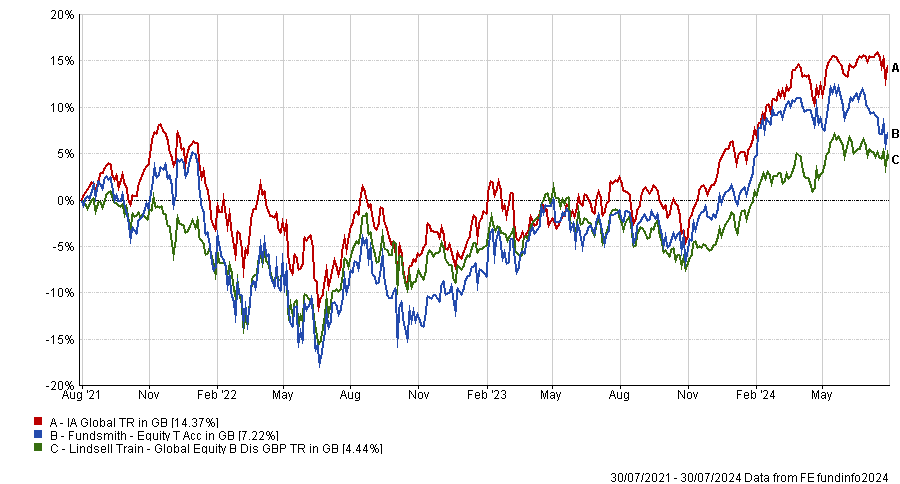Investment styles can be in and out of favour and the popularity pendulum has been receding for former crowd favourites Fundsmith Equity and Lindsell Train Global Equity.
Both strategies have lost accolades and money in recent years, with their assets under management shrinking (-17.2% to £23.9bn and -47.2% to £4.1bn respectively between January 2022 and today) and returns languishing, as the chart below shows.
Performance of funds against sector over 3yrs

Source: FE Analytics
During the FE Crown ratings reviews last week, Fundsmith Equity fell to a score of one for the first time in its history, joining Lindsell Train in the lowest ranking, where it had been since December 2021, as previously reported on Trustnet.
The Crown score is based on a fund’s performance over the past three years and is made up of three components – alpha, relative volatility, and consistently good performance, which the two funds haven’t been providing of late.
For investors who are still hoping for a comeback, we asked three experts which of the two options they prefer.
Darius McDermott, managing director at Chelsea Financial Services, weighted the similarities and differences in the two portfolios before siding with Lindsell Train.
Both are concentrated funds (under 30 stocks), managed by the same individuals since launch, have low turnover and both invest in “quality” companies. They are also similarly underweight the ‘Magnificent Seven’ and neither holds Nvidia. They also both have over 35% of their exposure in the consumer products sector.
But that is where the similarities end. There is no overlap in the top 10 positions and the Lindsell Train fund has a much higher allocation to the UK and much less in the US.
“With similar investment styles, the investor opinion on the UK versus the US is a key differentiator, coupled with their view on the Magnificent Seven valuations (the Lindsell Train fund has none of these),” McDermott said.
With these being the determining factors, he “marginally favoured” Lindsell Train Global Equity, primarily based on the valuation differences mentioned above.
His choice was seconded by Fairview Investing director Ben Yearsley, who came to the same conclusion by studying the managers, rather than their portfolios.
He liked Train’s “very concentrated approach” and was sure the manager would make investors money over the long term, “provided they can be patient enough with the fallow periods”.
Train’s “interesting and engaging” personality also came into Yearsley’s consideration, who admitted not buying into Smith’s fund because “you simply can’t get a meeting with him”.
He added: “Both managers can be quite intransigent to change. Nick Train has the edge and the ability to change his mindset, though results don’t back that up yet.”
Finally, Rob Morgan, chief analyst at Charles Stanley, looked at the funds’ styles and holdings for his pick, expressing a “slight preference” for Fundsmith as “a more well-rounded, all-season portfolio with a more premium ‘quality growth’ style that should keep delivering longer-term”.
It was admittedly “challenging” for Morgan to decide because both strategies focus on stock-picking with concentrated portfolios and have some holdings in common outside the top 10.
Also, both funds’ peak popularity has passed, he said, blaming their relative lack of exposure to the US, and in particular the tech behemoths, as their ‘Achilles heel’ in a market dominated by these names.
Because of this, “it might all boil down to investors’ preference for the individual companies”, although “there are some stylistic attributes of the managers that might favour one over the other”, he said.
Nick Train’s ability to identify resilient growing businesses with long-term cash flows has favoured him in the low-interest-rate era and has been less well-suited to the environment of higher inflation and interest rates.
“A sharp style rotation away from his preferred quality compounders has reduced the valuation multiples of growth companies,” he continued.
“An environment of subsiding inflation and lower interest rates should favour the fund’s style, but ultimately it is the manager’s stock picking that will be highly influential on performance, given the concentrated nature of the portfolio.”
Terry Smith’s approach tends to be more weighted to the US, which helps explain why the fund has underperformed by a narrower margin. Moreover, the much lower exposure to the US in the Lindsell Train fund of about 35% might be “pivotal to relative returns, especially in the shorter term”.
“With the ‘cheaper’ portfolio in terms of average price-to-earnings ratio of the constituent stocks, Train’s fund would probably fare better in a value-led rally, for instance, if interest rate cuts come through faster than anticipated,” he concluded.





